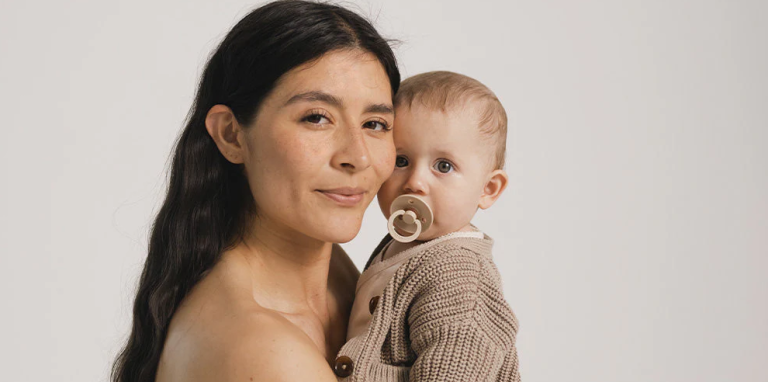Is Newborn Melatonin Safe for Your Baby?

Why do babies stay wide awake at 3 AM, and why does it feel like parents are the only ones not sleeping?
If parents have asked themselves that question while rocking a fussy newborn in the dark, they’re not alone.
Many parents have experienced those exhausting nights, wondering if their baby’s sleep patterns would ever align with theirs.
In this blog, parents will learn what research shows about newborn melatonin: when babies start producing it, what helps stimulate it naturally, and why giving supplements may do more harm than good.
Parents will also find tips that actually work to encourage better sleep without relying on medication.
What Is Melatonin and How Does It Work?
Melatonin is often referred to as the sleep hormone for good reason. Experts explain it as the body’s natural timer that signals when it’s time for bedtime.
The pineal gland produces this hormone when darkness falls, helping the body recognize it’s time to rest. It controls the sleep-wake cycle, which is why people feel sleepy as evening approaches.
Many parents are unaware that babies and adults have significantly different patterns of melatonin production.
While adult bodies have learned to make melatonin in rhythm with day and night, a newborn’s system is still building this ability.
Babies typically don’t establish a set sleep schedule because their bodies haven’t yet produced steady amounts of melatonin.
Do Newborns Produce Melatonin Naturally?

Yes, newborns produce melatonin naturally, but not immediately after birth. Experts tell new parents that babies start producing it around 6-12 weeks after birth.
Before then, they relied on what they got from their mother during pregnancy.
When mothers are breastfeeding, breast milk passes small amounts of melatonin, mostly during night feeds. Newborns have an undeveloped body clock.
Unlike adults, they often wake during the day and night because they haven’t yet associated darkness with the need for longer sleep. This is why 2 AM feedings are considered normal, even if they are tiring.
What Stimulates Melatonin in Babies and Toddlers?
Several factors help babies and toddlers produce melatonin naturally. Here’s what works best:
- Natural Light, Especially Morning Sunlight, helps set a baby’s internal clock, telling their body when to be awake and alert.
- Evening Darkness – Reducing bright and blue light before bedtime helps a baby’s brain prepare for sleep. Experts suggest using soft, warm lighting instead.
- Consistent Routine – Following the same steps each night teaches a baby’s body when to expect sleep. Research shows that a warm bath, comfortable clothes, and a quiet story can form a soothing and effective pattern.
- Calm Environment – Studies have found that a peaceful setting for nighttime feedings helps babies connect eating with rest, supporting their sleep cycle.
- Proper Nutrition – For older babies and toddlers, experts recommend foods containing tryptophan, an amino acid that helps the body make melatonin naturally.
Sweet dreams begin with these simple, natural steps that work with a baby’s biology, not against it. Parents should trust the process, stay consistent, and watch their little one find peaceful sleep.
Why Newborns Don’t Sleep Through the Night

Newborns wake frequently at night for key biological reasons, and understanding these patterns helps parents set realistic expectations.
Their limited melatonin production prevents them from having longer sleep stretches. At the same time, their tiny stomachs require regular feeding, especially with breast milk that is quickly digested and empties faster than formula.
Babies spend about half their sleep in light sleep states, which actually keeps them safer and more alert to their surroundings.
Most infants naturally start sleeping longer around 3-4 months as their bodies mature. While night wakings can be exhausting for parents, they’re completely normal for healthy development.
However, if a baby can’t settle or cries for extended periods, parents should consult their doctor to rule out underlying issues.
How Safe Is Melatonin for Kids?
When parents ask about giving melatonin to their children, experts are cautious with their response. Medical professionals firmly state that melatonin supplements should never be used for newborns and young infants.
For toddlers and older children, safety research remains limited. The American Academy of Pediatrics hasn’t approved melatonin for regular use in children, citing that “Melatonin should not be used in most healthy children with sleep problems.”
A concerning factor is that melatonin is sold as a supplement, not a medication. This means less testing and oversight.
Research indicates that the actual melatonin amounts in products often differ from the amounts claimed on the label. Experts always stress to parents: Talk with your pediatrician first.
Associated Risks with Melatonin

After years of studying children’s sleep patterns, researchers have identified several essential concerns about melatonin supplements that every parent should be aware of.
Here are the key side effects and issues experts have observed in clinical practice:
| Side Effect | What I’ve Observed |
|---|---|
| Daytime drowsiness | Children struggling to stay alert during school hours |
| Headaches | Mild to moderate headaches are reported as a common side effect |
| Bedwetting | Increased instances of nighttime accidents |
| Mood changes | Noticeable mood shifts in children using supplements |
| Hormonal effects | Impacts on puberty timing and development (still being studied) |
| Masked issues | Hides underlying problems like anxiety, sensory issues, or sleep apnea |
| Inconsistent dosing | Actual melatonin amounts often differ from label claims |
These concerns don’t mean melatonin is never appropriate, but they highlight why it’s crucial for parents to work with their pediatrician rather than treating it as a simple sleep solution.
Understanding these potential risks helps parents make more informed decisions about what is best for their child.
Can You Give Melatonin to a Newborn?
Parents should understand clearly: never give melatonin supplements to a newborn.
While parents may feel exhausted from sleepless nights, giving hormone supplements to infants poses serious health risks that aren’t worth it.
Newborns need time to develop their natural melatonin production, typically beginning around 8-12 weeks. Interfering with this natural process could affect development in ways experts don’t fully understand.
Research shows that maintaining routines, recognizing tired cues, keeping nights dark and days bright, and accepting frequent waking help parents cope.
This challenging phase is temporary, and a baby’s sleep will naturally organize itself as they grow.
Natural Ways to Support Baby’s Sleep and Melatonin Rhythm

Experts have found these simple methods help babies develop healthy sleep without supplements:
- Morning sunlight: Parents can expose their baby to natural light early, helping to set their internal clock correctly.
- Evening darkness: Parents should dim the lights two hours before bedtime and avoid all screens.
- Fixed routine: A consistent nightly sequence should never change: bath, massage, pajamas, feeding, lullaby.
- Sleep-friendly foods: For older babies, parents can serve foods rich in tryptophan at evening meals.
- Patience: Parents should understand that their baby’s sleep naturally improves with age.
- Cool room: Parents should maintain a slightly cool but comfortable sleeping temperature.
- White noise: Parents can use soft background sounds to mask household noises.
Trust the process, stay consistent, and remember that every small step forward is building the foundation for years of peaceful nights ahead.
When to Worry About Sleep Issues
Parents learn to distinguish between normal sleep challenges and those that require medical attention.
If a baby fights to breathe during sleep, snores loudly or stops breathing briefly, parents should call their doctor immediately.
Parents may notice babies making gasping sounds during naps, which can lead to crucial diagnoses. Excessive fussiness during feedings, paired with sleep disturbances, may signal reflux or food sensitivities.
Meanwhile, some babies with sensory issues react strongly to fabrics, sounds, or environmental changes.
When good sleep habits suddenly deteriorate despite consistent routines, parents should trust their instincts; seeking help shows wisdom, not weakness.
Conclusion
After everything parents read, try, and experience firsthand, one truth stands out: there’s no shortcut to healthy sleep, only support and patience.
Melatonin is a powerful hormone, but a baby’s body needs time to produce it naturally. Giving supplements too soon can lead to more risks than rewards, especially in infants.
Instead, what genuinely helps parents is embracing natural routines like morning sunlight, dim evening lighting, and calming bedtime rituals.
Parents are encouraged to share their experiences or tips on baby sleep in the comments below. Supporting one another through this phase makes the process easier for everyone.
As babies grow older and start to settle into longer stretches, parents can consider this guide, The Ultimate 4-Month-Old Baby Sleep Schedule: A Foolproof Guide. It’s a practical follow-up that builds on these early sleep foundations.






